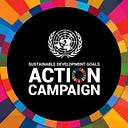Global Day of Solidarity Highlighted by UN75 Dialogue on Inclusion
Note this is the first in a series — see the second dialogue on the urgent need for climate action and the third on economic recovery
The Global Day of Solidarity on 22 May highlighted the need for a global response to the global threat of COVID-19. Around the world people united in action from sharing impactful solidarity stories to creating art highlighting themes from the pandemic demonstrating that we are #StrongerTogether.
Global Cooperation in the Face of a Pandemic
As part of this global day of solidarity in action, we kicked off a series of UN75 Dialogues aimed at exploring what international collaboration will look like in the future, especially as we emerge from this global crisis. This first dialogue was joined by Fabrizio Hochschild-Drummond, Under-Secretary-General and Special Adviser to the Secretary-General on the Commemoration of the United Nations 75th Anniversary who shared why global cooperation is even more important today:
“This pandemic has illustrated that multi-stakeholder multilateralism is a way to save lives. And where there’s a deficit in it — there’s no question that lives will be lost. Where there is no learning and no cooperation between countries and between sectors — lives will be lost. Where that learning takes place — lives will be saved.”
Building an Inclusive Society
As we joined the mass of actions on the Global Day of Solidarity, we convened a dialogue with activists who work in the area of diversity of inclusion. While actions and stories celebrated solidarity, this UN75 dialogue explored what we mean by solidarity and how we foster inclusion.
Panelists:
- Emmanual Jal | Former Child Soldier, Recording Artist, Entrepreneur
- Katlego Kolanyane-Kesupile | Human Rights Practitioner, Cultural Architect and TED Fellow
- Mohammed Sabo Keana | Team Lead, Almajiri Child Rights Initiative
- Thalita Gelenske Cuncha | CEO and Founder, Blend Edu
Guest Speakers:
- Marina Ponti | Global Director, UN SDG Action Campaign
- Fabrizio Hochschild-Drummond | Under Secretary-General and Special Adviser to the Secretary-General on the Commemoration of the United Nations 75th Anniversary
Moderator:
- Arrey Obenson | CEO and Co-Founder, Transformunity
The Greatest Challenges to Inclusion
The dialogue’s panelists agreed that what they most wish to see in the world in 25 years when the United Nations turns 100, is a world that is not only inclusive but has reimagined what inclusivity looks like. The solution is not to alter existing frameworks and structures to include vulnerable or minority groups, but rather to redevelop frameworks and structures within society that are built — from the start — for everyone.
Panelist Katlego Kolanyane-Kesupile described this concept:
“There seems to be this idea of inclusion being inviting other people to your party, as opposed to saying we all want to have a party; what does that party look like for us?”
Multiple panelists shared that the systems in place do not support and empower all people. These systems weren’t built with everyone in mind, and therefore don’t serve everyone.
Mohammed Sabo Keana emphasized how the global pandemic has made it even harder for our most vulnerable communities to access basic human rights:
“As we have seen, a lot of vulnerable groups under normal circumstances have difficulty accessing some basic and fundamental human rights — education, healthcare, water and sanitation — and with the pandemic we have seen that deepen so much.”
Solutions to Building an Inclusive Society
Across the board, the panelists shared an optimism that the world will be in a better place in 25 years. Katlego Kolanyane-Kesupile noted that while we surely continue to face challenges, she’s hopeful that we will be better positioned to manage them in the future.
Specifically, Emmanual Jal believes that achieving this kind of inclusion must be rooted in a collective mental shift within society:
“Change can come to you, but you will not see it if you’re still a prisoner of your own thoughts.”
Thalita Gelenske Cuncha offered a specific solution about the roles of businesses and economies in an inclusive society:
“We need to rethink the global economy making sure that human rights are a central element, and having the primary goal [be] to address inequalities… we need to reshape the way we measure success and growth in our companies and countries, going beyond GDP and going beyond profit margins.”
Create Change Starting Today
More than anything, the participants of the dialogue and speakers all agreed that every individual and every sector in society needs to start taking action now.
Marina Ponti called on each one of us to take action:
“We need more of the UN, but we need more actors being active. It’s not just government, it is local government, parliamentarians, civil society leaders, it’s youth. It’s all of society joining forces to find a solution.”
We cannot achieve the Sustainable Development Goals if we continue to leave the vulnerable people behind. We need to seek out the vulnerable and minority communities and bring them to table — today.
Watch the full recording of the dialogue and make sure you share your voice by taking the one-minute UN75 survey today. Follow @SDGaction on social media for updates and registration information on upcoming live dialogues.
